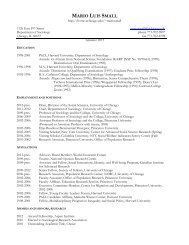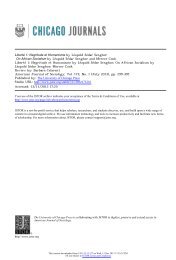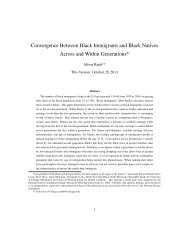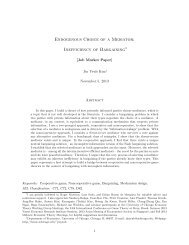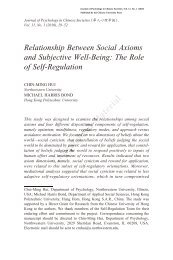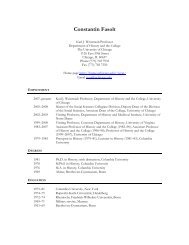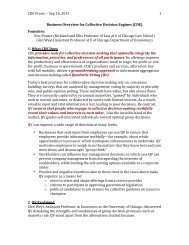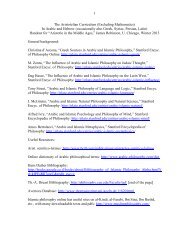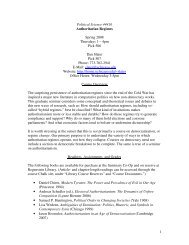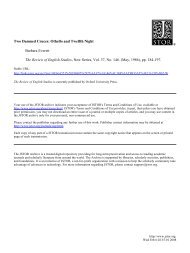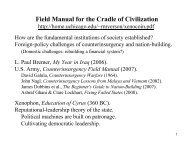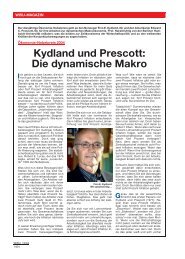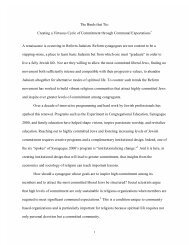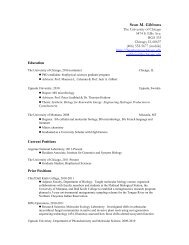Guide to the Study of Early Modern European History For Students ...
Guide to the Study of Early Modern European History For Students ...
Guide to the Study of Early Modern European History For Students ...
You also want an ePaper? Increase the reach of your titles
YUMPU automatically turns print PDFs into web optimized ePapers that Google loves.
Tugendhat, Ernst. Self-consciousness and Self-determination. Trans. Paul Stern. Cambridge, Mass.:<br />
MIT Press, 1986.<br />
Kuhn, Thomas S. The Structure <strong>of</strong> Scientific Revolutions. 2nd ed. Chicago: University <strong>of</strong> Chicago<br />
Press, 1970.<br />
Winch, Peter. The Idea <strong>of</strong> a Social Science and its Relation <strong>to</strong> Philosophy. London: Routledge &<br />
Paul, 1958.<br />
Feyerabend, Paul. Against Method. Revised ed. London: Verso, 1988.<br />
Foucault, Michel. The Order <strong>of</strong> Things: An Archaeology <strong>of</strong> <strong>the</strong> Human Sciences. New York:<br />
Pan<strong>the</strong>on Books, 1971.<br />
Said, Eward W. Orientalism. New York: Vintage Books, 1979.<br />
Wolf, Eric R. Europe and <strong>the</strong> People Without His<strong>to</strong>ry. Berkeley: University <strong>of</strong> California Press,<br />
1982.<br />
Todorov, Tzvetan. The Conquest <strong>of</strong> America: The Question <strong>of</strong> <strong>the</strong> O<strong>the</strong>r. Trans. Richard Howard.<br />
New York: Harper & Row, 1984.<br />
Gellner, Ernest. Nations and Nationalism. Ithaca: Cornell University Press, 1983.<br />
Gellner, Ernest. Plough, Sword and Book: The Structure <strong>of</strong> Human His<strong>to</strong>ry. Chicago: University <strong>of</strong><br />
Chicago Press, 1988.<br />
Anderson, Benedict. Imagined Communities: Reflections on <strong>the</strong> Origin and Spread <strong>of</strong> Nationalism. 2nd<br />
ed. London and New York: Verso, 1991.<br />
Bynum, Caroline Walker. Holy Feast and Holy Fast: The Religious Significance <strong>of</strong> Food <strong>to</strong> Medieval<br />
Women. Berkeley: University <strong>of</strong> California Press, 1987.<br />
Moore, R. I. The <strong>For</strong>mation <strong>of</strong> a Persecuting Society: Power and Deviance in Western Europe, 950-1250.<br />
Oxford: Blackwell, 1987.<br />
Moore, R. I. The First <strong>European</strong> Revolution, c. 970-1215. Oxford: Blackwell Publishers, 2000.<br />
Bartlett, Robert. The Making <strong>of</strong> Europe: Conquest, Colonization, and Cultural Change, 950-1350.<br />
Prince<strong>to</strong>n, N.J.: Prince<strong>to</strong>n University Press, 1993.<br />
VII. FIVE KINDS OF KNOWLEDGE<br />
1. GENERAL KNOWLEDGE<br />
The best way <strong>to</strong> make sure that you are not missing any elementary bit <strong>of</strong> knowledge<br />
about early modern Europe is <strong>to</strong> master one or two surveys <strong>of</strong> <strong>the</strong> period in detail and <strong>the</strong>n<br />
skim o<strong>the</strong>r surveys, which may be older or more recent, in order <strong>to</strong> measure <strong>the</strong>ir differences<br />
from <strong>the</strong> one's you've read carefully. Most people find this boring, and I know why: most<br />
textbooks and handbooks are boring. Books that make a case for a particular issue are<br />
usually more interesting, especially if <strong>the</strong>y happen <strong>to</strong> deal with an issue in which you are<br />
interested. Nor is <strong>the</strong>re any doubt that <strong>the</strong> focus <strong>of</strong> your examination will not be on basic<br />
his<strong>to</strong>rical knowledge, but on <strong>the</strong> most important and original scholarship that has been<br />
produced in <strong>the</strong> last half century or so. That is what you really need <strong>to</strong> know.<br />
But if you are a novice in <strong>the</strong> field, <strong>the</strong> basic information found in surveys designed<br />
<strong>to</strong> introduce you <strong>to</strong> <strong>the</strong> whole period may in fact turn out <strong>to</strong> be eye-opening. More imporant,<br />
your obligation as a teacher goes beyond teaching undergraduates <strong>the</strong> things in which you<br />
happen <strong>to</strong> be interested or <strong>the</strong> things his<strong>to</strong>rians have discovered in recent decades—not only<br />
because your students may be interested in something else, but also because <strong>the</strong>y will expect<br />
you <strong>to</strong> give <strong>the</strong>m a rounded introduction <strong>to</strong> <strong>the</strong> field as a whole. If only for those reasons<br />
<strong>the</strong>re is no way around studying <strong>the</strong> kinds <strong>of</strong> systematic overviews <strong>of</strong> <strong>the</strong> period that only<br />
textbooks and handbooks provide.<br />
16<br />
16



